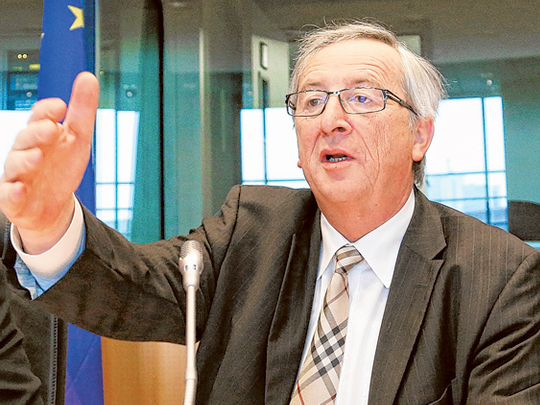
Brussels: Respected leader, defender of the euro and the wider European dream, Jean-Claude Juncker steps down this week as head of the Eurozone finance ministers group after eight often tumultuous years.
Known for his dry sense of humour and respected for his commitment to the European cause, the Luxembourg prime minister hands over the reins with the Eurozone in better shape than many believed possible after the ravages of the debt crisis.
No little part of his success has been his ability to keep everyone on board, reconciling the often sharply differing views of France and Germany, the top two economies in the bloc.
“When I want to speak in French, I think in German; when I want to speak in German, I think in French, with the result that I am totally incomprehensible,” he joked typically at one stage.
Alongside the humour, there is also sharp judgement, needed since he was named in 2005 as the first head of the now 17-state Eurozone.
He steered the single currency through the global financial crisis in 2007-08 which then morphed into the Eurozone debt crisis, proving popular with his colleagues and clearly winning their respect.
In July, however, he insisted wearily it was time to leave but when France and Germany failed to find a compromise candidate, they pressed him to stay on.
Sounder footing
Second time around, and having helped put the Eurozone on a sounder footing, Juncker announced this month his “irrevocable” decision to quit.
He has not been afraid to be blunt with member states when required and is well known for speaking out when others might not.
He has “two fatal flaws — he has an opinion and he is not afraid to share it”, said one European official.
In a farewell address to the European Parliament this month, Juncker typically did not mince his words, railing against unnamed, rich northern states who had become arrogant, laying down the law to their weaker southern EU partners.
He insisted that countries such as bailed-out Greece were going through real hardship and that their sacrifice should not be played down or dismissed.
Annoyed by one MEP who accused him of spouting platitudes, Juncker shot back: “You will see what platitudes really are in the next few years.”
Criticism and setbacks, the incredible strains of the debt crisis which threatened several times to sink the euro, none of this dampened his faith in a federal European state which could be home to all the old continent’s traditions and peoples after untold years of conflict and bloodshed.
He was awarded Germany’s prestigious Charlemagne Prize in 2006 for his commitment and vision, which he always tempered with a solid dose of realism.
Convictions
“For me, Europe is about taking a series of concrete steps and strong, perhaps even fervent, convictions,” he told German TV recently. “But strong convictions alone are worth nothing if you can’t be pragmatic too.”
Juncker was born December 9, 1954 in a Europe still struggling to rise from the wreckage of the Second World War when his father had been press-ganged into the German army.
His father was a strong influence, not least for his experiences as a metal worker and union member. A smoker, Juncker appreciates the finer things in life — good cognac, certainly — and holds firmly to the political right but he is suspicious of its simple prescription that free market economics can solve all problems.
He told MEPs that the social dimension — “the poor relation in the union” — should not be forgotten, with the strong having to do more than the weak.
“Juncker, he is the most Socialist Christian-Democrat there is,” said MEP Daniel Cohn-Bendit, leader of the Greens.
Juncker first joined the Luxembourg government in 1982 and has been at the top table ever since, serving as premier from 1995 — an office he says he hopes to keep for a while.
It is clear he has no plans to leave quietly.
“Now I will be a free man and I can express my own views ... you will hear from me!” he said after his address to Parliament.












